The problem lies in the fact that the YAML Resolver is set up to match floats as follows:
Resolver.add_implicit_resolver(
u'tag:yaml.org,2002:float',
re.compile(u'''^(?:[-+]?(?:[0-9][0-9_]*)\\.[0-9_]*(?:[eE][-+][0-9]+)?
|\\.[0-9_]+(?:[eE][-+][0-9]+)?
|[-+]?[0-9][0-9_]*(?::[0-5]?[0-9])+\\.[0-9_]*
|[-+]?\\.(?:inf|Inf|INF)
|\\.(?:nan|NaN|NAN))$''', re.X),
list(u'-+0123456789.'))
whereas the YAML spec specifies the regex for scientific notation as:
-? [1-9] ( \. [0-9]* [1-9] )? ( e [-+] [1-9] [0-9]* )?
the latter makes the dot optional, which it isn't in the above re.compile() pattern in the implicit resolver.
The matching of floats can be fixed so it will accept floating point values with an e/E but without decimal dot and with exponents without sign (i.e. + implied):
import yaml
import json
import re
All = {'one':1,'low':0.000001}
jAll = json.dumps(All)
loader = yaml.SafeLoader
loader.add_implicit_resolver(
u'tag:yaml.org,2002:float',
re.compile(u'''^(?:
[-+]?(?:[0-9][0-9_]*)\\.[0-9_]*(?:[eE][-+]?[0-9]+)?
|[-+]?(?:[0-9][0-9_]*)(?:[eE][-+]?[0-9]+)
|\\.[0-9_]+(?:[eE][-+][0-9]+)?
|[-+]?[0-9][0-9_]*(?::[0-5]?[0-9])+\\.[0-9_]*
|[-+]?\\.(?:inf|Inf|INF)
|\\.(?:nan|NaN|NAN))$''', re.X),
list(u'-+0123456789.'))
data = yaml.load(jAll, Loader=loader)
print 'data', data
results in:
data {'low': 1e-06, 'one': 1}
There is discrepancy between what JSON allows in numbers and the regex in the YAML 1.2 spec (concerning the required dot in the number and e being lower case).
The JSON specification is IMO very clear in that it doesn't require the dot before 'e/E' nor that is requires a sign after the 'e/E':

The PyYAML implementation does match floats partially according to the JSON spec and partially against the regex and fails on numbers that should be valid.
ruamel.yaml (which is my enhanced version of PyYAML), has these updated pattern and works correctly:
import ruamel.yaml
import json
All = {'one':1,'low':0.000001}
jAll = json.dumps(All)
data = ruamel.yaml.load(jAll)
print 'data', data
with output:
data {'low': 1e-06, 'one': 1}
ruamel.yaml also accepts the number '1.0e6', which PyYAML also sees as a string.
